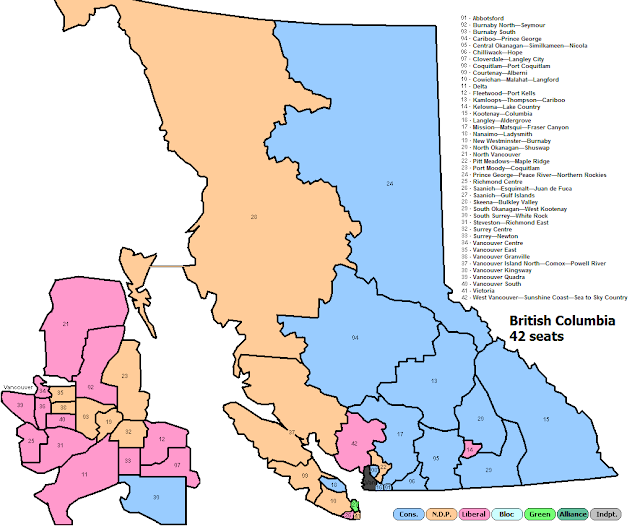The biggest problem with our system is that since we count each box independently, there is a chance the first poll does not indicate the final winner. This got me thinking exactly what chance this is. As such, I set out to re-watch historic elections and take notes.
This did not turn out the way I wanted at all. After watching both CBC and Global coverage it quickly became apparent that not every riding's first poll gets reported in time. By the time certain ridings get reported on, we are as many as 10% of the polls in, or more. For this reason, doing this on a Canada-wide scale for other elections in the same way I've done for 2015 is simply not logical or useful. However, I will see what I can do in terms of comparing those few ridings that actually are reported with just 1 poll to the final result for as many elections as is possible.
Regardless, here are the maps showing the earliest result available in each riding in the 2015 election:
To create this map I had to use various sources, including both TV network's "rolling results" bar, the riding focus graphics, mentions, and the actual maps they showed on-air. As such, it's very plausible that a first poll came in for many of these ridings that simply was missed by me.
The best way to get these results would be during a live election, since with the internet, you have access to all these results. However, failing that, I have a few conclusions:
Certain things are dependent on certain variables.
Even in the best cases, you can expect a 10% error.
In the worst instances, you may have a 50% error.
So what variables are we talking about? One is how close the race is. The closer things are the higher a chance the first poll will be inaccurate. Since the media likes focusing on close races this means there is an increased chance that if you are listening only, you'll get a high error. This means radio coverage and their focuses would be the most iffy. Watching on TV however, their focuses seem closer to 33%. The rolling bar however has a lower rate, as low as 10%, but that bar also can show result only after a few polls are in.
As such I've developed a quick guide. Roll a die. If it's a 1, the result is wrong. If they make a big deal about how close the race is expected to be, if it's a 1 or 2, it's wrong.
While this won't be a crystal ball, in terms of the odds, it's a good bet that you'll be in the general area of correct.
This is interesting to me, and as such, the next time we have an election here in this country, I will be keeping track of this information live, and produce a figure after each election. Hopefully after a few solid results, we can produce a reliable figure for exactly what the odds are that the first poll indicates the winner.








There is some confusion as to why I've posted this. The answer is that it is not for Canadians.
ReplyDeleteIn the UK when you first hear of a result from a seat, it is the final result.
I've done this for people in the UK, and who have elections like the UK, so that *they* can understand how likely a "first result" will be the "final result"